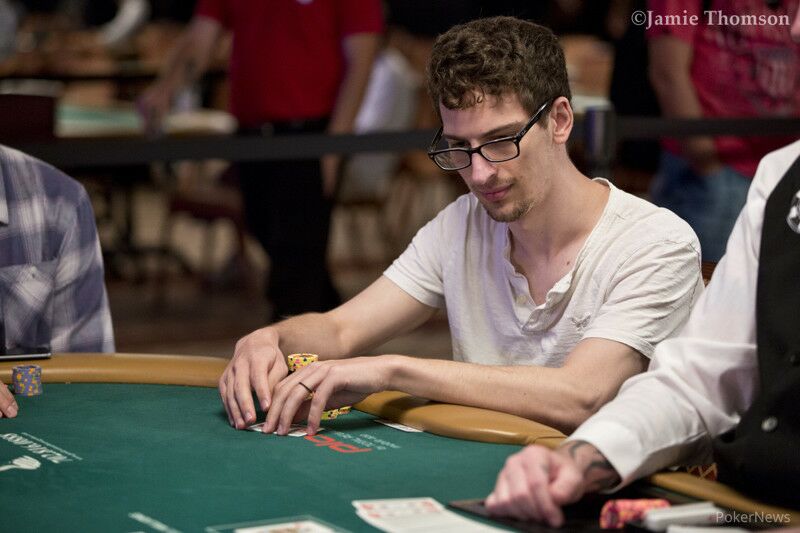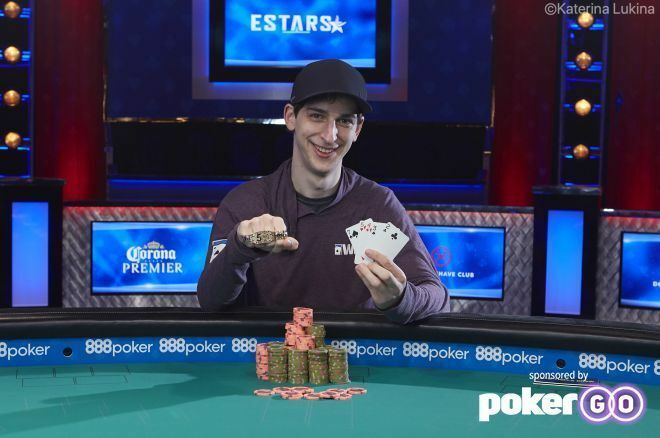(Editor's Note: This interview took place in March of 2022, just a few months before he won the 2022 WSOP Player of the Year)
– Hello, Dan. How are you?
– Everything is fine, it’s 12:30 PM here, and I just woke up.
– How old are you, by the way? Are you from the East Coast?
– I’m 29, born in New Jersey, but I’ve been living in California for the last three years.
– How did you first start in the world of cards?
– Since Chris Moneymaker's victory, I was only 10 then. I loved sports and watched ESPN all day long. Of course, I didn’t miss poker either. And that tournament with Moneymaker, Harrington, and Farha was shown in every detail. I remember very well watching the final table at a friend's home whose father was our baseball coach. My friend and I found sunglasses and also started playing cards while his parents laughed.
Then, at home, I constantly asked my relatives to play with me. When the boom started, my older brother, who was 18 at the time, started playing online at Paradise Poker. He played SNGs for $15, and I sat next to him the whole time and watched. I became truly obsessed with poker, persuaded my father to buy me all of Dan Harrington’s books, secretly opened accounts in rooms for myself, and played play money and sometimes freerolls. When I won something, I immediately bet my entire bankroll on the table. Naturally, there was no discipline at that age. This continued until I was about 14 years old.
– Why did you choose poker? What attracted you so much?
– I’ve loved competing all my life, even now I mostly play games that have some kind of rankings. And in poker, you can also provide for yourself, it suited me in all respects. I already understood then that in other games only the top players get normal money. As a child, I played chess at a high level, and later Halo, Hearthstone, and other games. Chess most of all, my parents even paid for me to study with grandmasters, but they constantly complained about how difficult it was to make money in chess. After Moneymaker’s victory, the idea was spread everywhere that anyone could succeed in poker.
– Did chess somehow prepare you for poker?
– Only in some minor aspects. In general, the term “preparation” in relation to poker is quite strange. I realized that I would be a professional already in college and immediately dropped out. I tried to convince several friends, whom I considered much smarter than myself, to follow my example. But I quickly realized that you can’t prepare for poker. You can only truly understand whether you are capable of success during your first serious downswing, especially live. It can literally destroy your brain, and it's impossible to prepare for it in advance. It is very important at such moments not to change the strategy and approach to the game, and this has nothing to do with mental development and success in other areas.
– Here, probably, the main reason is that the result in poker says nothing about the quality of the work done. You can win a particular hand, but that doesn't mean it was played well.
– I agree, and in theory, all players understand this, but in practice not all even experienced professionals succeed in this.
– I can tell you from a personal example how stubborn players can be. On one Asian app, I fell for super users and played with them for a whole month. I continued to convince myself: “I’m playing against fish and there are five of them at each table, how can I lose to them?” Then I studied the database and understood everything, but it took a whole month for me to even suspect something. In your opinion, what are the main reasons for such problems?
– Inability to cope with emotions. If a person is not capable of this, then he will have huge problems in poker, especially in complex lineups. In closed games, there is a solution – simply ban everyone who is stronger. But in most cases, this will not work. As I said, I grew up watching ESPN broadcasts and many of the regulars became idols for me. Then I crossed paths with many people at the tables and saw how my perception was false.
– How did you feel then?
– I was a little upset that among them were outright gambling addicts who simply cannot control their lives. But there were players who lived up to my expectations, and I tried to emulate them.
– How did you determine who is successful and who is not?
– The most obvious sign is the ability to win at a distance. But this is very difficult to determine by eye, especially since many may have some kind of business on the side. I drew some conclusions from communication, from their attitude to the game, and from conversations with friends. It seems that over time I have learned to quite accurately determine who really knows how to play and who is just pretending.

– Name the most obvious “red flags”?
– The first, of course, is when they start asking for a loan. I started playing live when I was 18 and was shocked by the number of players who literally beg for money at the table and then don’t give it back, even for ridiculous amounts. In the poker community, it is generally not customary to name debtors. Because they have an uncanny ability, despite all the debts, to find money and return to the game, where they are happily welcomed. Unfortunately, such parasitic relationships are very common in poker, especially at high stakes.
– How did your parents feel about poker when you were 10-14 years old?
– I did everything to hide all this from them. But periodically they found out and caused scenes. And they did the right thing because it was clearly an unhealthy hobby. I absolutely could not control my emotions. I was incredibly lucky that by the time I reached adulthood, I didn’t lose interest in poker and forced myself to get a grip on it.
The period from 14 to 16 years was an endless series of winnings in freerolls, small deposits, and losses. I even have vivid gambling stories from those times. For example, when I was 16, my class and I went to North Carolina on some field trips. But I missed it all because I played poker all day and went from $150 to $20k. It all ended with a heads-up $200/$400 limit hold'em with some reg who was holding the lobby. Naturally, I lost every penny in 30 minutes and then sat in complete prostration among my classmates.
– After school did you go to college?
– Yes, I graduated from school in 2011, just after Black Friday. I think I was very lucky that this happened because before that my relationship with poker was as toxic as possible. I moved to California to study, made a lot of new friends, and played almost no poker for the next two years.
After the second year, my friends and I went to the Turning Stone casino, where you can play from the age of 18. This was my first experience live. “Wow, it turns out you can play and observe the emotions of your opponents,” I was surprised. “I simply have no right to lose in such lineups.” Unlike online, here I immediately believed in myself and realized that I wanted and could beat them all. I started reading books, paid attention primarily to psychology, and fought the urge after several unsuccessful hands to just push everything.
Quite quickly I started playing in the black. We went to Turning Stone for the weekend, and I stayed for two months. Took $1,000 with me and brought home over $100k. I played 14 hours a day at $2/$5 and $5/$10. The maximum buy-in for $2/$5 is $500, and I had about a dozen sessions where I made it to $5k or more. There was also one night when I played $10/$25 heads-up against a not so strong opponent, and that day I won a third of my total profit.
The lineups were incredible. For example, every Friday my grandfather came, who always bluffed his entire stack in the first hand, and played incredibly tight for the rest of the session. And he never changed this tradition. It took me two sessions to figure it out. After that, I played the first hand with him with a small 3-bet preflop, then if I had something, I called all the streets, and if I didn’t, I shoved the turn. It was a guaranteed $300 every Friday. Nowadays you can't find street poker like this anymore.
This trip brought back my love for poker. I returned to college, completed a semester, and on the eve of my 21st birthday, I decided to leave school. My parents were not happy about this. Now they have come to terms, but it took several years. Before that, not a single family dinner was complete without them talking about returning to college. But this was understandable; they knew perfectly well how poker experiments at school ended for me.
– You are 21 and have $100k. How did you plan to proceed further, did you come up with some strict rules for yourself?
-- I used my bankroll aggressively at first because I had the option of going back to college at any time. I didn’t intend to grind small stakes, but immediately tuned in to big shots. $100k is a lot of money, but I knew that after college I could easily earn it at a regular job.
After dropping out of college, I almost immediately went to Europe for the WSOP, it seems that the European stage of the World Series was held somewhere near Paris. There I met Elliot Smith, who had been playing high stakes on PokerStars for many years. We started talking, he liked my game, and he put me in the main event. Then I didn’t win anything, but we continued to communicate. I probably overreacted when I said that I started taking poker seriously at 21. This happened a little later, haha.
The next stop was PCA. One day Elliott came up to me and said that there was a seat in an incredibly sweet game – PLO $25/$50. I replied that I didn’t even really remember the rules. He told me not to worry about such nonsense and promised to take any percentage. I came to the table with my $2.5k and Elliott's $7.5k. It turned out on the spot that the game had a mandatory $100 straddle from the button, and in every hand, someone always bet a $1,000 re-straddle. That is, I paid $175 every round to play push-fold. I decided to play only aces, waited for the first ones, got in a 60/40, and doubled. After a couple of rounds, I put it in again and ended up with a $40k pot. I threw everything away for two hours, dropped to $30k, but doubled again with aces.
A normal person would have finished by now, but I continued playing. At the PCA, the poker room was closing for the night and the dealer announced that we were playing the last hand. I still remember her very well. One guy from Detroit said “fuck it” and bet a $6k straddle and another guy behind him made a blind call. I made a squeeze with double suited, got a call from the second one. The flop was , we checked, I did it because I was scared. Turn , my opponent finally looked at two cards and bet the pot, and I shoved. River was a blank, I only have a pair of queens. The opponent revealed two cards, which he looked at – . Then he very slowly began to pull on the rest, and when I was already sweating, he said that I had won. The $120k pot came to me, and it was more than my entire bankroll at the beginning of the hand.
– Why didn’t Elliot sit down himself, but put you in?
– Good question, I don’t even know. He probably believed in me a lot. He had not played PLO at all before, and during my school years, I had experience of gambling sessions in any games. In the last two years, we have hardly communicated; with the onset of Covid, our paths diverged a little.

– How did your career develop further?
– Elliot invited me to his place. I packed my things and went to Vancouver. He was one of the top $25/$50 regs at the time and was constantly battling with Truteller, who was the obvious top player. I wasn't playing anywhere near that level and switched to mixes. Even before moving, I managed to play them in Commerce.
While playing NL $10/$20, I noticed that everyone at my table was young and hungry, but at these limits, everyone was over 50, and it seemed like they weren’t even trying. In my first session, I sat down at the table at 4 AM while Barry Greenstein was playing heads-up against a local reg. I studied the rules of badugi and triple draw right at the table. In one of the hands of Badugi, Barry opened with a pair, he then very politely explained to me that this was not the best combination in this game.
But I was very lucky that the overall level in the mixed games was very poor back then. I started communicating with regs, hired a coach, and very quickly began to play at a plus. Then I moved to Vancouver. At that time, there were no badugi regs on Stars at all; there was one guy from Turkey sitting in the lobby, but he didn’t play very well. A player from Azerbaijan also regularly came, who played 100% of hands and regularly changed 4 cards. He would play $100/$200, but if he lost, he would move on to $200/$400 and $400/$800. As soon as I broke even, I immediately closed the tables. He appeared every day at the same time and thanks to him I became a badugi reg. Over time, I began to play heads-up with that Turk and Vladimir Shchemelev. During this period I managed to win very well. And here I was again very lucky, because soon Shaun Deeb, Raul Gonzalez, and Johannes Becker appeared in the lobby and would have torn me apart.
At the same time, Elliot and I continued to grind the games. During his trip to the EPT in Monte Carlo, he managed to secure two seats in the $200/$400 NL private game. I got into it for 20%, at the table were Antonio Esfandiari, Sorel Mizzi, and two Russian guys, around whom the game was gathered. In the first hand, Antonio opened $1,200 UTG, received three calls, I had in the SB, I called too. And the Russian guy in the BB started giggling and raised $25k. Antonio called. They had very deep stacks and I sat down with $20k and put everything in the middle. A suited flop is revealed without my suits, the Russian immediately announced all-in for $300k, and Antonio folded. He opened a jack and a small suited card. “Yours,” I said. “No,” he smiled and opened offsuit. I was trembling with emotion, and this guy began to rejoice that he managed to bluff Antonio. He obviously didn't care about the main pot.
At the end of the session, this Russian asked me: “Are you playing the $25k tomorrow?” I shook my head. “Now you play,” he threw me a chip for $25k and said that I had 20%. This was my first high roller tournament. The most interesting thing is that he did not leave me any contact information so that I could contact him, I didn’t even know his name and never saw him again in my life. Perhaps he would have found me himself if I had gone to the money, but, to be honest, I don’t exclude the possibility that he didn’t even remember me in the morning. I was eliminated from the tournament before winning any prizes.
– Did you have any unsuccessful shots?
– Certainly. Only the first six months were easy. The hardest downswing I experienced was when I started playing Chinese poker. I played well, but could not beat the famous Matt Kirk. I was confident that I was playing stronger, but we had three matches and he won everything I was willing to risk every time.
– Did you play on that dubious app?
– Yes, everyone played there then. There were some Russians who came to the 2015 World Series and they really sucked, they won a ton of money, and when they were found out, they just left saying “Thanks for the free money, idiots.” I lost 2/3 of my bankroll to Matt before I forced myself to stop. This match became a reload for me, after which I reconsidered my attitude towards poker. I went down the limits, began to closely monitor the results, played only when I had 400 big bets per limit, gave up long sessions, calmly ended when I was down, and did not try to win back.
– Why did this particular loss affect you so much?
– I don’t know myself. I was 22 years old and already had a 12-year career behind me as an unstable and, in fact, losing player. I understood that I could become a plus player, all that was missing was self-control. I myself find it difficult to answer why losing to Matt was the turning point. Maybe I had reached a point where I would have had to quit poker and my self-preservation instinct kicked in.
– How long did you end up spending in Canada?
– Quite a bit, from January to June. Decided to return to the USA after that trip to Monaco. I immediately started grinding live cash in Los Angeles. There was one very successful LAPC series during which I simply could not lose. Out of 60 sessions, I finished 55 with good results. Moreover, the limits were constantly growing. We started at $100/$200 and ended at $800/$1,600, and I no longer violated the rules of bankroll management. I won about 30 big bets a day.
Since then, there have been no special problems in my career. I tried to get a foothold in Bobby's Room, but it didn't work out. But I approached these sessions very responsibly and took almost no risks. I consider myself one of the best mix players; there are probably 10 people stronger than me in the whole world. But everyone has their limit. I usually don’t think of chips at the table as money, and even at high limits, the amounts don’t put pressure on me. But at $1,500/$3,000 that changed, I started telling myself that this pot was playing for a car, and this one was for a whole house. I tried to gain a foothold in this game twice but lost 100-200 big bets and abandoned this idea. Perhaps it was just bad luck.
Now I act much calmer. I sometimes play $400/$800 in Vegas, but due to Covid, almost all the action has moved online. Here I play $150/$300, $200/$400 and even $800/$1,600. There’s less variance online, and a lot more hands, and I’m happy with everything so far...














